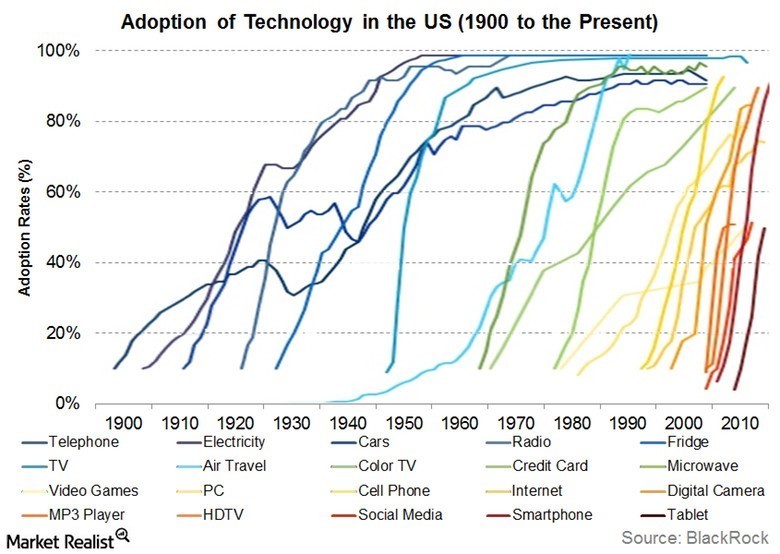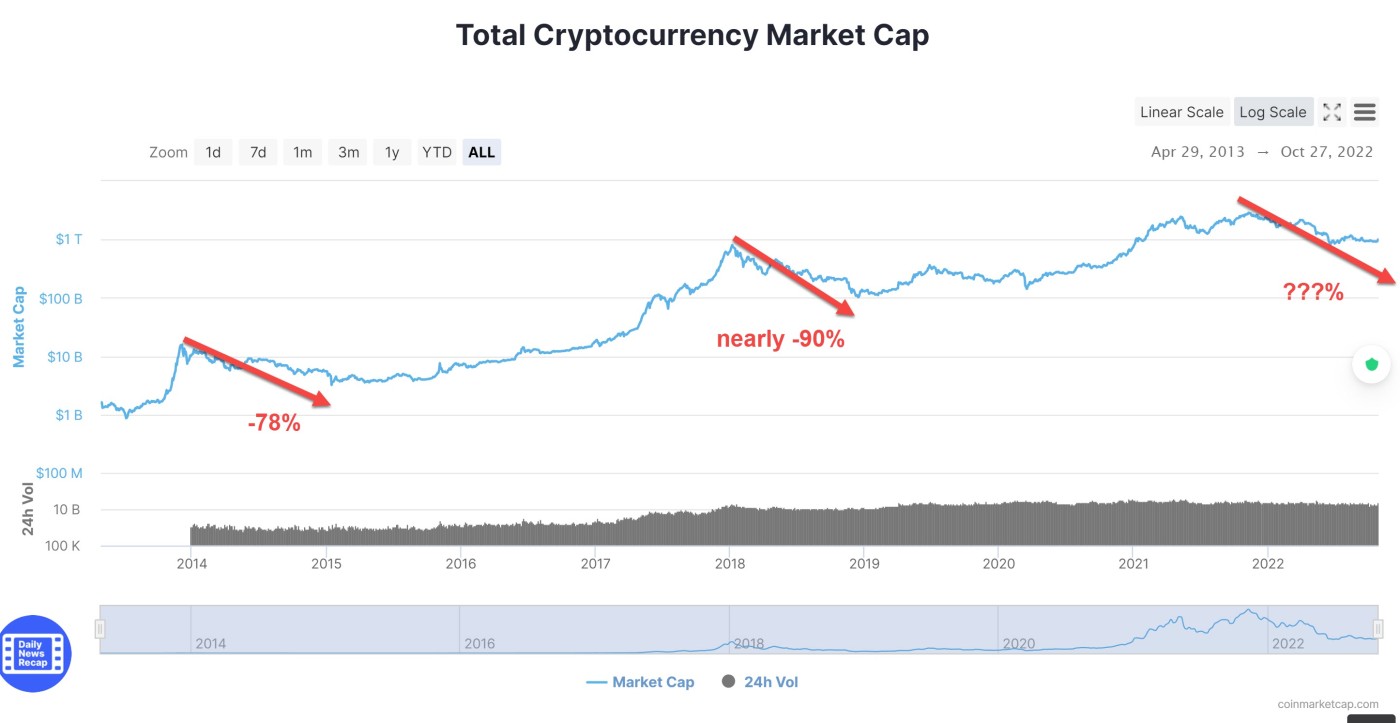Market Lab Report / Dr. K's Crypto-Corner
by Dr. Chris Kacher
The Metaversal Evolution Will Not Be Centralized™
I've discussed pros and cons of cryptotechnology/blockchain in prior pieces, but some of the more salient points deserve repeating as it also helps shape public policy and future regulation. I am one of the three co-founders of Web3 Academy in the EU designed to help properly educate lawmakers in terms of how to regulate cryptotechnology as well as helping to inform the public including students.
Fraud vs. Utility
In the 1990s, the internet was riddled with pornography as well as bad actors that perpetuated credit card fraud along with a deluge of disinformation in the form of scams. Then despite the launch of valuable internet-based technologies, the dot-com bubble burst in early 2000, so by late 2002 near the bottom of the ruthless three year bear market, some were saying the internet was just a fad. Similar has happened repeatedly in the case of Bitcoin/crypto since 2011 especially during bear markets. Major publications are guilty of this including The Wall Street Journal, Barron's, and Financial Times.
That said, fraudsters do not invalidate the transformational tech that exists within crypto such as DeFi (decentralized finance) which upends legacy banking due to its vastly superior efficiencies and removal of many middlemen, or NFTs (non-fungible tokens) which evolve private ownership, or Web3 (the next evolution of the internet) which prevents censorship while the user **not big tech** owns their own content and can participate in profit-sharing.
That said, using crypto to buy normal goods and services is one of its lesser important aspects. Indeed, Bitcoin may in time become a global mode of exchange across common vendors but this will likely be one of the last things Bitcoin realizes as it matures. In the meantime, countless families in developing nations have used the technology to convert their plunging fiat into Bitcoin then into dollars. Further, millions have used it in the remittances market as sending small sums was prohibitively expensive via normal banking channels until Bitcoin was created. It is also helping the world's more than 2 billion unbanked and partially banked send and receive value while many have used it to move currency cross border such as wealthy Chinese who use it to move more than $50k dollar equivalents worth of yuan outside of China, against the government's orders.
While the price of Bitcoin remains volatile, volatility will bleed out as Bitcoin matures but this is still at least a decade away. Until then, and since 2013 when instant conversions became readily available, vendors that accept Bitcoin have been immediately converting it to fiat to remove the rate of exchange risk.
Trust in tech?
But should we put our trust in tech? Like it or not, technology has overall become an increasingly important part of our daily lives. We trust in tech on a daily basis outside of blockchain/crypto. We trust that our bank accounts wont say zero if there is a running balance. We rely on AI to point us in the right direction on videos that may interest us on YouTube or products on Amazon or music on Spotify. We rely on our smartphones. In this evolving digital world, the internet has become almost as essential as oxygen.
But should we put limits on our trust? Should we trust in corporations such as Twitter, YouTube, and Facebook who censor on their own whims? Many users were censored or penalized for even discussing COVID. Should we trust in PayPal who without judge or jury was going to deduct up to $2500 from your account if you were deemed a spreader of "disinformation"? PayPal recently had to walk back this policy claiming the revised text was sent in error. Should we trust in governments that will use CBDCs (central bank digital currencies) to control people's fiat even more so than today? Try taking out more than 10,000 GBP from HSBC bank in the UK without issues. One never truly owns fiat. Just ask the Canadians who tried to help the protesting truckers by sending them money. With CBDCs, where you spend your money can be controlled and the interest rate on your money can be adjusted. Cashless societies are just beginning. A growing number of businesses in China no longer accept cash. More on CBDCs here and here.
Perhaps it is better to trust in permissionless, trustless tech that has been fully stress tested in real-time over government-controlled tech.
Trustless: It will allow participants to interact publicly or privately without any trusted third party.
Permissionless: No user needs any authorization from a governing or centralized body for participating.
Trustless is necessary because we cannot trust everyone. There will be a bad actor somewhere who will exploit the system. Hackers, both black and white, are useful because they reveal weaknesses in the system.Permissionless means no government or company (Facebook, YouTube, etc) can censor anyone. Individuals are free to create and become self-sovereign. Crypto's use case is the freedom to communicate and transact. In many of the countries in the world which are more free, these freedoms are taken for granted so remain unimportant until they are taken away. In a step in the right direction, Elon Musk just announced that those who were banned on Twitter will now be unbanned.
Crypto/blockchain can be made permissionless and trustless through Web3 so can be more dependable in the long run than nation-states since power corrupts. History is littered with examples of authoritarian plutocratical regimes where the few benefited at the expense of the many. We are seeing this play out in virtually every country today. It is only a matter of degree. Quantitative easing accelerates this process as the rich who own assets get richer against debasing fiat. Meanwhile, the poor who live paycheck to paycheck are more dependent on the value of their fiat currency so become poorer. When global debt becomes this large as Ray Dalio of Bridgewater has shown, money supply M2 never materially decreases. There is always another crisis that spurs more QE. Until then, the world sits and waits.
Web3
Web3 is the counterbalance to the spread and practice of authoritarianism which widens the chasm between the haves and have-nots. Crypto is the beating heart of Web3. Web3 is permissionless and trustless and enables anyone to transact and communicate without intermediaries. While nothing is perfect, Web3 empowers the individual by making them self-sovereign more so than any other technology before it.
There are far more use cases than just means of exchange or store of value when it comes to crypto. But many crypto companies offer little in the way of true utility much as many of the dot-coms went bust. Incisive study helps prevent one from getting sucked into the crypto hype which is rampant.
Web3 opens a new world of utility such as DAOs (decentralized autonomous organizations) which have no central authority such as a CEO as well as tokenization which is the oil in the crypto engine that enables numerous forms of utility that never existed in Web2 such as:
1) Profit sharing among participants which incentivizes product development and marketing efforts
2) Partial ownership among participants
3) Voting rights to steer the DAO
4) Helping to participate in the development and profit-sharing of the creation. Roy Price who launched Amazon Studios which won a record number of BAFTAs is building a Web3-centric movie studio comprised of DAOs where scripts can be worked on by many and the final creation profit-shared by the contributors. This removes the centralized funding aspect of Hollywood which often prevents some of the more brilliant scripts from seeing the light of day. Development execs have to answer to stakeholders, so are more likely to choose consensus over contrarian.
5) In the case of an artist or musician, investors can buy the DAO-associated token in the hopes that the value will rise if they believe the person is talented. By contrast, Web2 gatekeepers can restrict creators from accessing the true power of their fans and community. Creators are then forced into the traditional rails where the corporate world takes much of their equity and profits in return for support and exposure.
6) NFTs where a) individuals can own a piece of the artist- as their reputation rises, so does the price of their NFTs, b) online gaming where you can port your items across different gaming platforms, c) profit-sharing of a brand's value: The Hundreds is a company that announced it would pay royalties to owners of the NFTs that were used in some of its clothing collections. Every new clothing line that used that emblem would give you a dividend. Partially decentralizing the brand’s value in this way spurred The Hundreds’s community to go out of their way to promote it. Sharing ownership incentivizes everyone to become a builder and contributor. As of October 2022, total NFT royalties paid out have topped $1.8 billion.
Because of the way Web3 is designed, anyone can build on any Web3 company. This means the community around a platform can co-create enabling the platform ecosystem to grow even stronger.
But when mass adoption?
As a new technology develops, the majority often overlook its massive potential but instead put far more focus on its downsides. Fears are often spurred by mainstream media who make isolated case examples seem like the norm. In consequence, many important traits of the internet were misunderstood or underrated back in the 1990s. Many made degrading claims against the internet such as saying that video streaming was a silly pipe dream due to bandwidth limitations. Unsurprisingly, those who grew up with the internet were more likely to embrace it diminishing the odds of making such claims. Since they were more comfortable using it, they more clearly saw its potential.
Fortunately, understanding the technology is not required to use it. Most didnt and still dont understand the innerworkings of TCP/IP that shapes the backbone of the internet; likewise, you dont have to know how an engine works to drive a car. That said, greater understanding at least on a user level and mass adoption sometimes come as the technology starts to mature. This economically incentivizes builders to create an easy-to-use interface (UI). AOL and Netscape did this for the internet in the early to mid-1990s. Such UI is being developed for blockchain/crypto across various platforms because it is economic to do so, ie, the potential profits are massive.
Before maturity, the growth of the cutting edge technology is often exponential as such tech rides its respective S-curve. Notice how the steepness of each curve is generally higher with the more recent technologies.

On freedoms
But while the first order effects of S-curve technologies are evident, there are also higher order effects with crypto. When we look back centuries ago, there was no separation of church and state. Given where the world sits, separation of money and state is now undergoing intense scrutiny. While Web3's use case is freedom to communicate, Bitcoin's use case is freedom to transact. It separates money and state.
You cant create more of Bitcoin beyond what is allowed by its code which has never been violated, ie, no double spend, etc. Bitcoin is a store of wealth not in the absolute sense of being stable, but in the decentralized sense that it is governed by code that no one can break. No central bank can manipulate how many Bitcoin are in circulation. Unlike central bank controlled fiat, it cannot be inflated away.
Traditional fiat has and always will be devalued by central banks. Bitcoin cannot be devalued in this manner. Its growing network effect and hash rate has increased its value against fiat over every cycle, thus even with its two -94%, 87% and -84% corrections, $1 in Bitcoin in 2010 is worth millions of dollars today ($21k / $0.007 avg cost in 2010 = $3 mil). That said, Bitcoin remains a risk-on investment thus remains speculative until it matures which is still at least a decade off.
As for accessing one's Bitcoin, satellites, normal wifi, and normal broadband can provide internet access across the majority of places on the planet. Some remote lands may be an exception, but this represents a small fraction of the population.
Black Swans
All that is to say that nothing is 100% guaranteed. Nothing says Bitcoin wont go to zero, though the odds are becoming diminishingly small with time due to the network and Lindsey Effect.
If electricity or the internet is cut off by governments, VPNs, mesh networks, and serverless circumvention tools which do not rely on third-party servers were all designed to deal with this and continue to be developed. Governments are the slow animal in the herd. Protecting internet access is integrally linked to freedoms of expression and association and forms a crucial part of global democracy and human rights. Better tech is always being built to deal with such nation-state interventions. But if we assume "argument ad absurdum" does not apply here, a global shutdown of the internet and electricity implies a world that is nearing its end in which case, Bitcoin/crypto is the least of our concerns.
But buyer beware
The talking heads on YouTube with their millions of followers have led their followers to ruin so far this year, trying to call bottoms in Bitcoin. Some of the more well known hosts have admitted to losing massive sums. This is a repeat of 2014 and 2018, both brutal bear markets where Bitcoin lost -87% and -84%, respectively, and altcoins typically lost more than -97%. Most all cryptocurrencies never came even close to reclaiming their old highs. Remind anyone of the dot-com bubble aftermath? Rampant casualties are standard for cutting edge technology.
Fortunately, my blockchain metrics and long-term macro studies kept me largely out of the crypto bears of 2014 and 2018 when I sold more than 90% of my crypto holdings by January 30, 2018 as cryptocurrencies in my portfolio topped in late January, more than a month after Bitcoin topped. I then got my first major buy signal in Mar-2019 as the new bull market kicked off. More recently, in Feb-2022, I started shorting so remain in profit so far this year.
We started cautioning members as far back as Nov-2021 when Powell removed the word "transitory" then became a full blown hawk by Dec-2021. On Jan 5, 2022, I removed most crypto names from the Crypto Picks list with the last three stalwarts removed on Feb 10, 2022:

Cutting edge tech is never static
Despite the current and past crypto bear markets, transformations are taking place as many have migrated into crypto. The total value of digital assets as represented by crypto in the form of DeFi, gaming, the metaverse, DAOs, DApps, and NFTs, among other tech was just several billion dollars back in 2016. Its total value then peaked at just under $1 trillion by the end of 2017 before undergoing a nearly -90% correction by the end of 2018 due to tighter monetary conditions. M2 shrunk momentarily.

Global tightening
We are currently undergoing the mother of all global tightening conditions due to the extreme overreach by the Fed and other central banks due to COVID. I therefore expect the value of cryptocurrencies (digital assets) to fall substantially further from current levels. While I've been suggesting a major Bitcoin low of roughly $11k, this may become "$11k and pray" suggesting wick lows well under $10k (as we saw in Jan-2015 when Bitcoin hit $150) unless some black swan crisis materializes which forces the Fed to start printing trillions like they did during COVID.
Dead bat bounces are standard during bear markets. The current bounce which may already be over rests on the hope that the Fed will "only" have to hike by 50 bps instead of 75 bps in December. But so what? The hikes have been and will continue to be historically huge at least out to December. Then once the Fed halts or reduces rates, that is still no guarantee a bottom will have been reached if 1930-32 and 2000-2002 are any guides.
Evolutionary
The bottom line is cutting edge tech rarely sits still but instead evolves at an exponential pace because sheer demand makes such new creations impactfully economic. In consequence, crypto/blockchain/Web3/AI are all exponentially evolving due to the vast number of individuals who are building and creating regardless of where the price of Bitcoin/crypto goes. Indeed, many have leapfrogged from their high paying roles in Silicon Valley to blockchain/crypto and Web3 development as they share in the transformational impact of far greater freedoms and efficiencies that crypto enables. The evolution will not be centralized.
#vitalikbuterin #jasonlowery #erikvoorhees #nickszabo #sambankmanfried #francissuarez #changpengzhao #andreasantonopolous #estebanordano #gavinwood #edwardmoncada #josephlubin #tylerwinklevoss #etc
